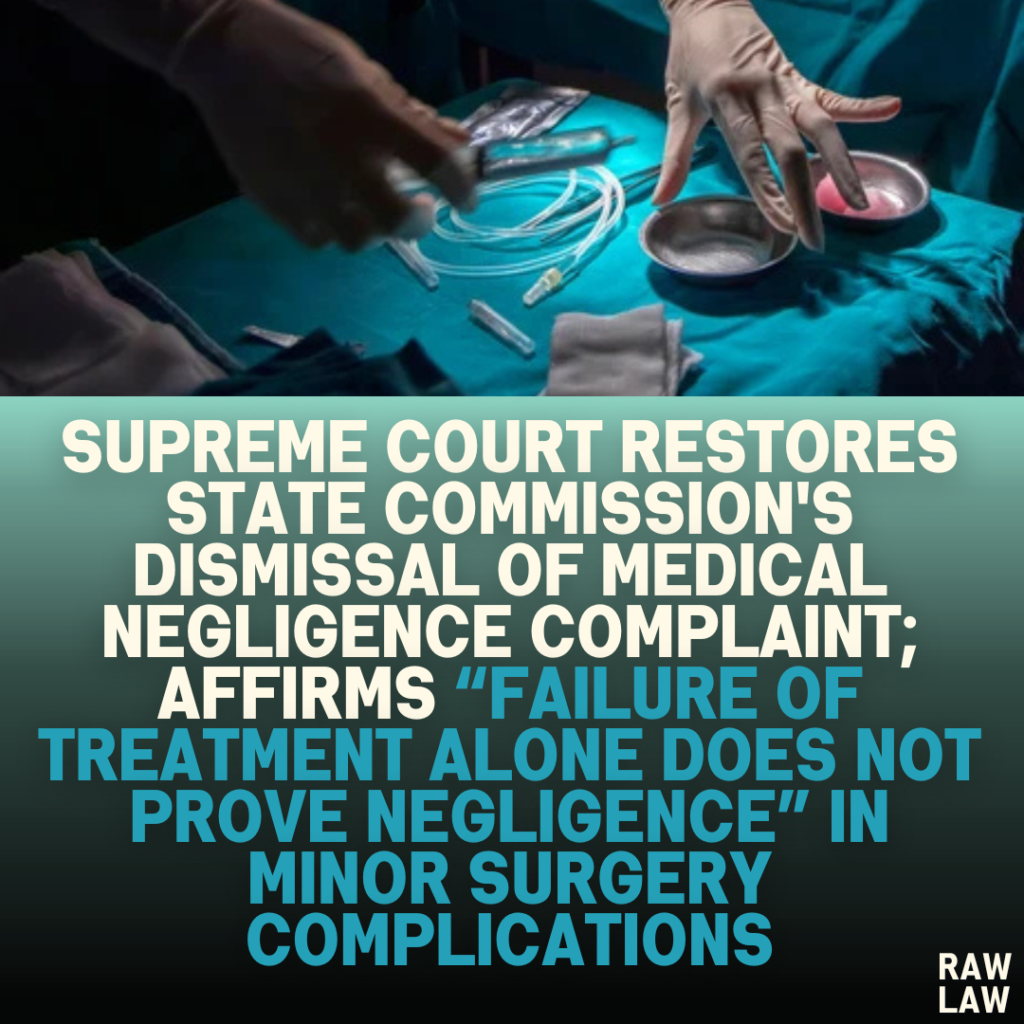Court’s Decision:
The Supreme Court overturned the National Consumer Disputes Redressal Commission (NCDRC)’s decision, restoring the State Commission’s order that dismissed the medical negligence complaint against Dr. Neeraj Sud and the Post Graduate Institute of Medical Education & Research (PGI). The Court held that no compensation was warranted, asserting that the failure of treatment, in this case, did not equate to medical negligence due to the absence of evidence proving a lack of care or skill on the doctor’s part.
Facts:
The complainants, a father and his minor son, brought a case of alleged medical negligence to the State Commission after the child underwent surgery for ptosis (a drooping eyelid) at PGI. Post-surgery, the child’s vision deteriorated, and his ptosis worsened. Dissatisfied with the outcome, they sought compensation for medical expenses and suffering. The State Commission dismissed the complaint, citing no evidence of negligence. The complainants appealed, and the NCDRC partially allowed the complaint, finding the respondents liable for damages.
Issues:
The primary issue before the Supreme Court was whether the failure of treatment outcomes alone sufficed to establish actionable negligence in medical cases where no clear breach of duty was evidenced.
Petitioner’s Arguments:
The petitioners argued that the NCDRC’s decision lacked basis, contending that the unfavorable surgical outcome did not substantiate negligence, especially as no proof indicated that the surgery deviated from accepted medical standards or that the doctor was unqualified or careless.
Respondent’s Arguments:
The complainants contended that the worsening of the child’s condition post-surgery suggested negligence and a lack of due care, warranting compensation for the additional suffering and expenses incurred.
Analysis of the Law:
The Court emphasized that actionable negligence in the medical field requires (1) a duty to exercise due care, (2) a breach of that duty, and (3) consequent damage. It stressed that an adverse outcome alone does not constitute negligence unless evidence shows that the treatment fell below accepted medical standards.
Precedent Analysis:
Referencing Bolam v. Friern Hospital Management Committee, the Court underscored that a doctor acting in accordance with accepted norms of practice is not negligent unless proven otherwise by a body of medical experts. The Court also relied on its previous decision in Jacob Mathew v. State of Punjab, reiterating that negligence claims require showing that a medical professional lacked necessary skill or failed to exercise it reasonably.
Court’s Reasoning:
The Court found that the NCDRC’s compensation order was unsubstantiated by any evidence of overt negligence. The patient’s post-surgery complications, though unfortunate, did not imply negligence, as the doctor had performed the procedure within recognized medical standards and possessed requisite skills and qualifications. No expert evidence suggested otherwise.
Conclusion:
The Supreme Court set aside the NCDRC’s order, restoring the State Commission’s dismissal. The Court concluded that the complainants had failed to prove actionable negligence, dismissing their compensation claim.
Implications:
This decision reinforces the principle that an unsuccessful medical outcome does not automatically imply negligence. It highlights the judiciary’s reliance on expert testimony and established standards to assess liability in medical negligence cases, ensuring that only clear breaches of duty attract compensation.



